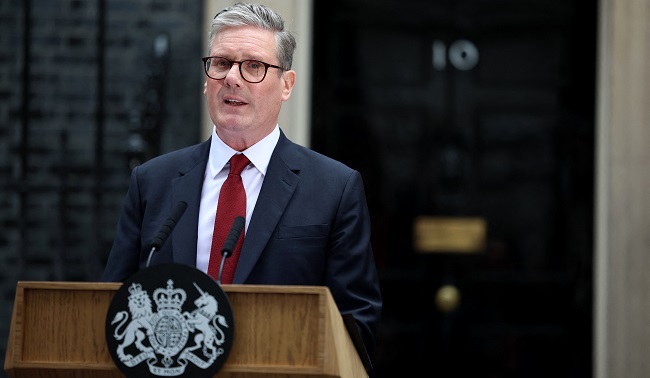Prime Minister Sir Keir Starmer has expressed strong support for Ukrainian President Volodymyr Zelensky, describing him as a “democratically elected leader” following remarks by US President Donald Trump, who labeled Zelensky a “dictator.”
In a call with Zelensky on Wednesday evening, Sir Keir defended Ukraine’s decision to suspend elections during wartime, drawing a parallel to the UK’s suspension of elections during World War II. Downing Street emphasized that this stance was “perfectly reasonable” given the ongoing conflict.
Zelensky’s five-year term was set to conclude in May 2024, but elections have been postponed under martial law, declared after Russia’s invasion. Trump had earlier criticized Zelensky, accusing him of doing a “terrible job” and refusing to hold elections.
Sir Keir is scheduled to visit Washington, DC, next week for his first in-person meeting with Trump. The Prime Minister intends to use the meeting to advocate for a “US backstop” to deter future Russian aggression against Ukraine.
The increasing strain between the US and Ukraine has heightened the political stakes for Sir Keir, who has indicated his willingness to deploy British troops to Ukraine as part of a peace agreement, contingent on a US security guarantee.
Western officials clarified that any troop deployment would involve fewer than 30,000 personnel, aiming to reassure the Ukrainian people rather than act as a peacekeeping force. Sir Keir’s plan underscores his commitment to strengthening Ukraine’s security and maintaining Western unity in the face of Russian aggression.
In his phone call with Zelensky, Sir Keir “stressed the need for everyone to work together”, a Downing Street spokesperson said.
“The prime minister reiterated his support for the US-led efforts to get a lasting peace in Ukraine that deterred Russia from any future aggression,” they added.
Zelensky said they had discussed “upcoming plans and opportunities”, adding: “UK’s support matters indeed, and we will never forget the respect the British people have shown for Ukraine and our citizens.”
There has been widespread criticism of Trump’s comments around the world – including from Sweden’s prime minister as well as German Chancellor Olaf Scholz, who said it was “simply wrong and dangerous”.
Trump’s former vice-president, Mike Pence, also criticised the comments, posting on X: “Mr President, Ukraine did not ‘start’ this war. Russia launched an unprovoked and brutal invasion claiming hundreds of thousands of lives.”
Conservative leader Kemi Badenoch also defended the Ukrainian leader, writing on X that Zelensky was “the democratically elected leader of Ukraine who bravely stood up to Putin’s illegal invasion”.
But Badenoch said Trump was “right that Europe needs to pull its weight” and called on Sir Keir to “get on a plane to Washington and show some leadership”.
Liberal Democrat leader Sir Ed Davey said calling Zelensky a dictator “must be where the line is drawn” and he hoped “the whole political spectrum… will speak with one voice in opposition to Trump’s lies”.
Former Conservative PM Boris Johnson posted on X to say “of course Ukraine didn’t start the war”.
“Trump’s statements are not intended to be historically accurate but to shock Europeans into action,” he added.
According to Western officials, there are now preliminary discussions about providing a reassurance force to Ukraine.
This force could use drones and intelligence gathering planes to monitor Ukrainian cities, critical infrastructure and ports rather than have troops in the east of the country.
This would be part of plans to restore a safe international airspace over Ukraine and make the waters of the Black Sea secure.
Western officials said there might be larger land forces based in countries bordering Ukraine.
They also said that any US backstop is more likely to be in the form of airpower rather than troops on the ground and that these aircraft may be based in countries neighbouring Ukraine such as Poland and Romania.
Russia’s ambassador to the UK, Andrei Kelin, again rejected the idea of foreign peacekeeping troops being allowed in Ukraine in the event of any peace deal.
Speaking to BBC Newsnight, the Russian ambassador to the UK said Moscow would not accept troops from the UK or other European nations in Ukraine, even if Trump approved the idea.
Mr Kelin also questioned whether there could be a potential peace agreement without fresh elections in Ukraine.
Trump’s attacks came after Zelensky accused the US president of living in a “bubble” of Russian disinformation.
The US and Russia’s relations have grown closer in recent days, after officials met in Saudi Arabia and agreed to negotiate an end to the war.
Ukraine and European leaders were not invited to the talks.



